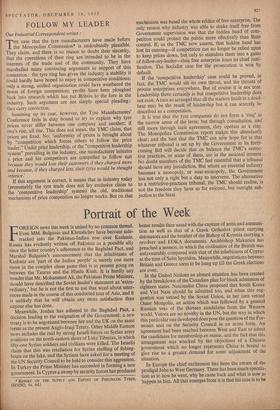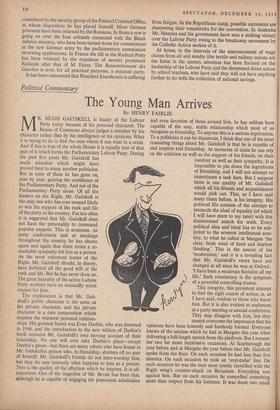Portrait of the Week
FOREIGN news this week is united by no common thread. Even MM. Bulganin and Khrushchev have become side- tracked into the Pakistan-Indian row over Kashmir. Russia has evidently written off Pakistan as a possible ally since the latter country's adherence to the Baghdad Pact, and Marshal Bulganin's announcement that the inhabitants of Kashmir are 'part of the Indian people' is merely one more move in the complex chess game that is at present going on between the Taurus and the Hindu Kush. It is hardly any wonder that Mr. Mohammed Ali, the Pakistani Prime Minister, should have described the Soviet leader's statement as 'extra- ordinary,' but he is not the first to use that word about utter- ances made in the course of this conducted tour of Asia, and it is unlikely that he will obtain any more satisfaction than anyone else has done.
Meanwhile, Jordan has adhered to the Baghdad Pact, a decision leading to the resignation of the Government; a new treaty is to be negotiated between her and the UK on the same terms as the present Anglo-Iraqi Treaty. Other Middle Eastern news includes the raid by strong Israeli forces on Syrian army positions on the north-eastern shore of Lake Tiberias, in which tifty-one Syrian soldiers and civilians were killed. The Israelis claim that this was retaliation for Syrian shelling of fishing- boats on the lake, and the Syrians have asked for a meeting of the UN Security Council to be held to consider this aggression. In Turkey the Prime Minister has succeeded in forming a new government. In Cyprus a sweep by security forces has produced
• REPORT ON THE SUPPLY AND EXPORT OF PNEUMATIC TYRES.
(HMSO, 6s. 6d.)
better results than usual with the capture of arms and ammuni- tion as well as that of a Greek Orthodox priest carrying detonators and the brother of the Bishop of Kyrenia carrying a revolver and EOKA documents. Archbishop Makarios has preached a sermon, in which the civilisation of the British was unfavourably compared with that of the inhabitants of Cyprus at the time of Saint Spyridon. Meanwhile, negotiations between Britain and Greece seem to be hung up till the Greek elections are over.
In the United Nations an absurd situation has been created by the breakdown of the Canadian plan for block admission of eighteen states. Nationalist China proposed that South Korea and Viet Nam should be admitted too, and when this sug- gestion was vetoed by the Soviet Union, in her turn vetoed Outer Mongolia, an action which was followed by a general Russian veto of the thirteen candidates from the Western world. Vetoes are no novelty in the UN, but the way in which this particular one developed does pose the question of the For- mosan seat on the Security Council in an acute form. An agreement had been reached between West and East to admit the candidates for membership en masse, and the fact that this arrangement was wrecked by the objections of a Chinese government which no longer represents China is bound to give rise to a greater demand for some adjustment of the situation.
In Europe the chief excitement has been the return of the prodigal John to West Germany. There has been much specula- tion as to how he went, why he came back and what is now to happen to him. All that emerges from it is that his case is to be , considered by the security group of the Federal Criminal Office, at whose disposition he has placed himself. More German prisoners have been returned by the Russians. In Bonn a row is going on over the four colonels connected with the Blank defence ministry, who have been turned down for commissions in the new German army by the parliamentary commission reviewing applications. In France the rift in the Radical Party has been widened by the expulsion of several prominent Radicals after that of M. Faure. The Rassenzblement des Gauches is now, for all practical purposes, a separate party.
It has been announced that President Eisenhower is suffering from fatigue. In the Republican camp, possible successors are sharpening their tomahawks for the convention. In Australia' Mr. Menzies and his government have won a striking victory over the Labour Party owing to the breakaway movement by the Catholic Action section of it.
At home, in the intervals of the announcement of wage claims from all and sundry (the textile and railway unions are the latest in the queue), attention has been focused on the leadership of the Labour Party and the threatened direct action by school teachers, who have said they will not have anything further to do with the collection of national savings.



































 Previous page
Previous page